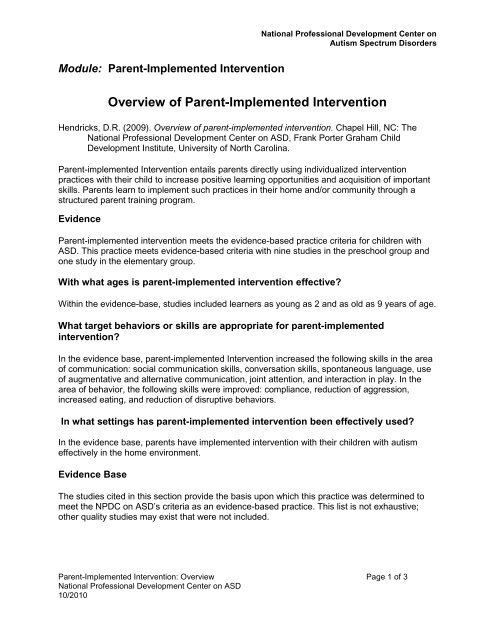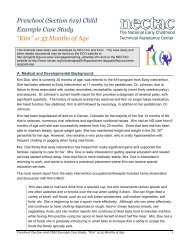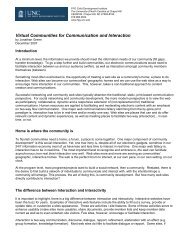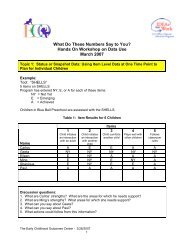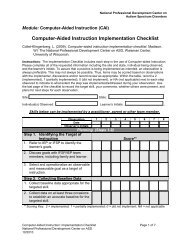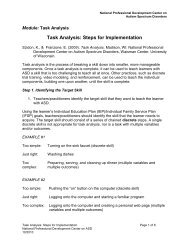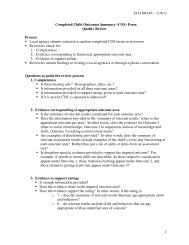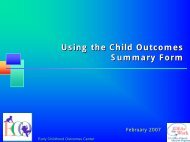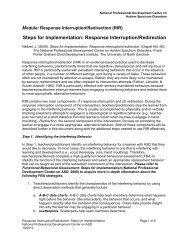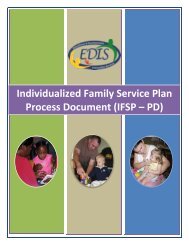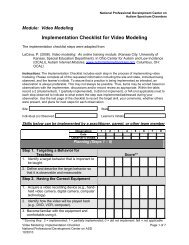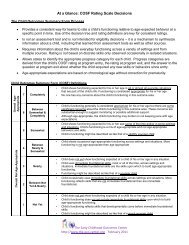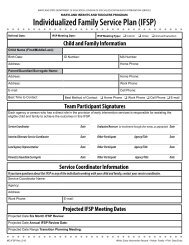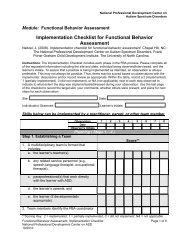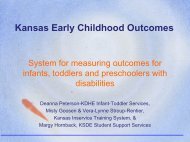Task Analysis Data Sheet - National Professional Development ...
Task Analysis Data Sheet - National Professional Development ...
Task Analysis Data Sheet - National Professional Development ...
Create successful ePaper yourself
Turn your PDF publications into a flip-book with our unique Google optimized e-Paper software.
Module: Parent-Implemented Intervention<br />
<strong>National</strong> <strong>Professional</strong> <strong>Development</strong> Center on<br />
Autism Spectrum Disorders<br />
Overview of Parent-Implemented Intervention<br />
Hendricks, D.R. (2009). Overview of parent-implemented intervention. Chapel Hill, NC: The<br />
<strong>National</strong> <strong>Professional</strong> <strong>Development</strong> Center on ASD, Frank Porter Graham Child<br />
<strong>Development</strong> Institute, University of North Carolina.<br />
Parent-implemented Intervention entails parents directly using individualized intervention<br />
practices with their child to increase positive learning opportunities and acquisition of important<br />
skills. Parents learn to implement such practices in their home and/or community through a<br />
structured parent training program.<br />
Evidence<br />
Parent-implemented intervention meets the evidence-based practice criteria for children with<br />
ASD. This practice meets evidence-based criteria with nine studies in the preschool group and<br />
one study in the elementary group.<br />
With what ages is parent-implemented intervention effective?<br />
Within the evidence-base, studies included learners as young as 2 and as old as 9 years of age.<br />
What target behaviors or skills are appropriate for parent-implemented<br />
intervention?<br />
In the evidence base, parent-implemented Intervention increased the following skills in the area<br />
of communication: social communication skills, conversation skills, spontaneous language, use<br />
of augmentative and alternative communication, joint attention, and interaction in play. In the<br />
area of behavior, the following skills were improved: compliance, reduction of aggression,<br />
increased eating, and reduction of disruptive behaviors.<br />
In what settings has parent-implemented intervention been effectively used?<br />
In the evidence base, parents have implemented intervention with their children with autism<br />
effectively in the home environment.<br />
Evidence Base<br />
The studies cited in this section provide the basis upon which this practice was determined to<br />
meet the NPDC on ASD’s criteria as an evidence-based practice. This list is not exhaustive;<br />
other quality studies may exist that were not included.<br />
Parent-Implemented Intervention: Overview Page 1 of 3<br />
<strong>National</strong> <strong>Professional</strong> <strong>Development</strong> Center on ASD<br />
10/2010
Module: Parent-Implemented Intervention<br />
<strong>National</strong> <strong>Professional</strong> <strong>Development</strong> Center on<br />
Autism Spectrum Disorders<br />
Evidence<br />
Preschool<br />
Aldred, C., Green, J., & Adams, C. (2004). A new social communication intervention for children<br />
with autism: A pilot randomized controlled treatment study suggesting effectiveness.<br />
Journal of Child Psychology and Psychiatry, 45, 1420–1430.<br />
Ducharme, J. M., & Drain, T. L. (2004). Errorless academic compliance training: Improving<br />
generalized cooperation with parental requests in children with autism. Journal of the<br />
American Academy of Child and Adolescent Psychiatry, 43, 163-172.<br />
Gentry, J. A., & Luiselli, J. K. (2008). Treating a child’s selective eating through parent<br />
implemented feeding intervention in the home setting. Journal of <strong>Development</strong>al<br />
Physical Disabilities, 20, 63-70.<br />
Gillett, J. N., & LeBlanc, L. A. (2007). Parent-implemented natural language paradigm to<br />
increase language and play in children with autism. Research in Autism Spectrum<br />
Disorders, 1, 247-255.<br />
Koegel, R. L., Symon, J. B., & Koegel, L. K. (2002). Parent education for families of children<br />
with autism living in geographically distant areas. Journal of Positive Behavior<br />
Interventions, 4, 88-103.<br />
McConachie, H., Randle, V., Hammal, D., & Le Couteur, A. (2005). A controlled trial of a<br />
training course for parents of children with suspected autism spectrum disorder. The<br />
Journal of Pediatrics, 147, 335-340.<br />
Moes, D. R., & Frea, W. D. (2002). Contextualized behavioral support in early intervention for<br />
children with autism and their families. Journal of Autism and <strong>Development</strong>al Disorders,<br />
32, 519-532.<br />
Ozonoff, S., & Cathcart, K. (1998) Effectiveness of a home program intervention for young<br />
children with autism. Journal of Autism and <strong>Development</strong>al Disorders, 28, 25-32.<br />
Rocha, M. L., Schreibman, L., & Stahmer, A. C. (2007). Effectiveness of training parents to<br />
teach joint attention in children with autism. Journal of Early Intervention, 29, 154-172.<br />
Symon, J. B. (2005). Expanding interventions for children with autism: Parents as trainers.<br />
Journal of Positive Behavior Interventions, 7, 159-173.<br />
Parent-Implemented Intervention: Overview Page 2 of 3<br />
<strong>National</strong> <strong>Professional</strong> <strong>Development</strong> Center on ASD<br />
10/2010
Module: Parent-Implemented Intervention<br />
<strong>National</strong> <strong>Professional</strong> <strong>Development</strong> Center on<br />
Autism Spectrum Disorders<br />
Elementary<br />
Charlop-Christy, M. H., & Carpenter, M. H. (2000). Modified incidental teaching sessions: A<br />
procedure for parents to increase spontaneous speech in their children with autism.<br />
Journal of Positive Behavior Interventions, 2(2), 98-112.<br />
Selected Additional References<br />
Brookman-Frazee, L. (2004). Using parent/clinician partnerships in parent education programs<br />
for children with autism. Journal of Positive Behavior Interventions, 6, 195-213.<br />
Brookman-Frazee, L., Stahmer, A., Baker-Ericzen, M. J., & Tsai, K. (2006). Parenting<br />
interventions for children with autism spectrum and disruptive behavior disorders:<br />
Opportunities for cross-fertilization. Clinical Child and Family Psychology Review, 9(3,4)<br />
181-200.<br />
Gray, D. E. (2002). Ten years on: A longitudinal study of families of children with autism.<br />
Journal of Intellectual and <strong>Development</strong>al Disability, 27, 215-222.<br />
Johnson, C.R., Handen, B.L., Butter, E., Wagner, A., Mulick, J., Sukhodolsky, D.G., et al.<br />
(2007). <strong>Development</strong> of a parent training program for children with pervasive<br />
developmental disorders. Behavioral Interventions, 22, 201-221.<br />
Koegel, R. L., Bimbela, A. & Schreibman, L. (1996). Collateral effects of parent training on<br />
family interactions. Journal of Autism and <strong>Development</strong>al Disorders, 26, 347–359.<br />
Koegel, R. L., Glahn, T. J., & Nieminen, G. S. (1978). Generalization of parent-training results.<br />
Journal of Applied Behavior <strong>Analysis</strong>, 11, 95–109.<br />
Levy, S., Kim, A., & Olive, M.L. (2006). Interventions for young children with autism: A synthesis<br />
of the literature. Focus on Autism and Other <strong>Development</strong>al Disabilities, 21, 55-62.<br />
Moes, D. R., & Frea, W. D. (2000). Using family context to inform intervention planning for the<br />
treatment of a child with autism. Journal of Positive Behavior Interventions, 2, 40-46.<br />
Sofronoff, K., Leslie, A., & Brown, W. (2004). Parent management training and Asperger<br />
syndrome. Autism: The International Journal of Research & Practice, 8, 301-317.<br />
Parent-Implemented Intervention: Overview Page 3 of 3<br />
<strong>National</strong> <strong>Professional</strong> <strong>Development</strong> Center on ASD<br />
10/2010


